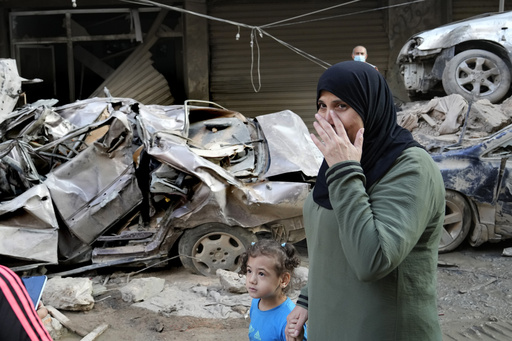BEIRUT — An Israeli airstrike on Friday resulted in the death of two Lebanese soldiers and left three others wounded, as reported by Lebanon’s military. This attack came just hours after the Israeli armed forces targeted the headquarters of U.N. peacekeepers in southern Lebanon for the second consecutive day, injuring two peacekeepers.
The events raised significant concerns as they involved Lebanon’s official military, which has generally remained uninvolved in the ongoing conflict between Israel and the Iran-supported Hezbollah. Simultaneously, Israel intensifies its campaign against Hezbollah, marked by extensive airstrikes across Lebanon and advancing military operations along the border.
In the capital city of Beirut, rescue teams were seen searching through debris from a collapsed building following an Israeli airstrike that led to at least 22 fatalities and multiple injuries the previous night. Over the past year, Hezbollah has been launching rockets into Israel in support of the Palestinian cause, particularly following the deadly attacks perpetrated by Hamas on October 7, which claimed the lives of approximately 1,200 individuals and kidnapped 250 others.
In response, the Israeli military has been actively striking Hezbollah’s positions in Lebanon, which has resulted in the deaths of over 2,237 people, including Hezbollah fighters and civilians, as indicated by Lebanon’s health ministry. Among the casualties reported on Friday were a two-year-old and a 16-year-old who lost their lives due to airstrikes in the village of Baysarieh.
Since October 2023, Hezbollah’s actions have resulted in the deaths of 29 civilians and 39 Israeli soldiers both in northern Israel and southern Lebanon, particularly following the beginning of the ground invasion by Israel on September 30.
Furthermore, an Israeli airstrike targeted a structure near a Lebanese army checkpoint in the southern province of Bint Jbeil on Friday. The Israeli military clarified that their intent was to strike Hezbollah positions, and subsequent investigations revealed that they were unaware of the Lebanese army’s presence in the targeted area.
While Lebanon’s army has mostly refrained from direct involvement in the conflict, they had previously retreated approximately five kilometers from their observation posts along the border after Israel initiated its ground invasion. The last reported direct engagement between the two military forces occurred on October 3 when Israeli tank fire struck a Lebanese army outpost, resulting in one soldier’s death.
Lebanese troops and U.N. peacekeepers are positioned in southern Lebanon to uphold U.N. Security Council Resolution 1701, which concluded a brutal month-long war between Israel and Hezbollah in 2006. Despite their presence, Lebanese soldiers and peacekeepers have struggled to prevent Hezbollah from fortifying their positions near the border, which Israel claims violates the U.N. resolution.
In addition to the attacks on Lebanese soldiers, the Israeli military fired upon U.N. peacekeepers stationed in Naqoura, injuring two for the second day running. An initial probe indicated that Israeli forces mistakenly targeted peacekeepers while aiming at what they perceived as a threat located nearby.
Following the attack, one peacekeeper required hospitalization in Tyre, while the other received on-site treatment. The peacekeeping mission known as UNIFIL later reported the incidents, underscoring that peacekeepers should be safeguarded by all conflict parties. The United Nations chief condemned the strikes, labeling them as severe breaches of international humanitarian law.
Additionally, the French foreign ministry accused Israel of deliberately targeting peacekeeper positions and formally protested through diplomatic channels. U.S. Defense Secretary Lloyd Austin also emphasized the necessity for Israel to prioritize the safety of UNIFIL forces and transition toward diplomatic negotiations as soon as possible.
UNIFIL was established after Israel’s 1978 invasion of southern Lebanon and has seen an expansion of its mandate after the 2006 conflict, allowing it to conduct patrols along a designated buffer zone.
The aftermath of airstrikes in Beirut left residents in shock. Civil defense teams worked tirelessly in the Burj Abi Haidar neighborhood, where a three-story building was destroyed by an Israeli strike, resulting in numerous casualties. Ahmad al-Khatib, a resident, recounted the harrowing experience of rescuing his young daughter from beneath the rubble after their nearby apartment was struck.
Hezbollah’s media reported that the airstrikes aimed to eliminate a high-ranking security figure within the group, although he was not present at the targeted locations during the attacks. An additional resident expressed desperation over lacking a safe place to seek refuge amid ongoing strikes.
As hostilities continued, Hezbollah maintained its rocket attacks into Israel, prompting air raid alarms north of Tel Aviv, where interception efforts led to debris causing property damage but no injuries. While the group’s missile strikes have disrupted life in Israel, they have generally resulted in few casualties.
However, an anti-tank missile fired from Lebanon tragically ended the life of a Thai farm worker in northern Israel. Hezbollah’s representatives declared that their operations would intensify, signaling that more frequent attacks on populated areas of Israel are anticipated.
“This is only the beginning,” asserted Mohammed Afif, a spokesperson for Hezbollah, as he stood amidst the ruins of a recently struck area in Beirut’s southern suburbs. “I tell the enemy that you have only seen the minimum.”



